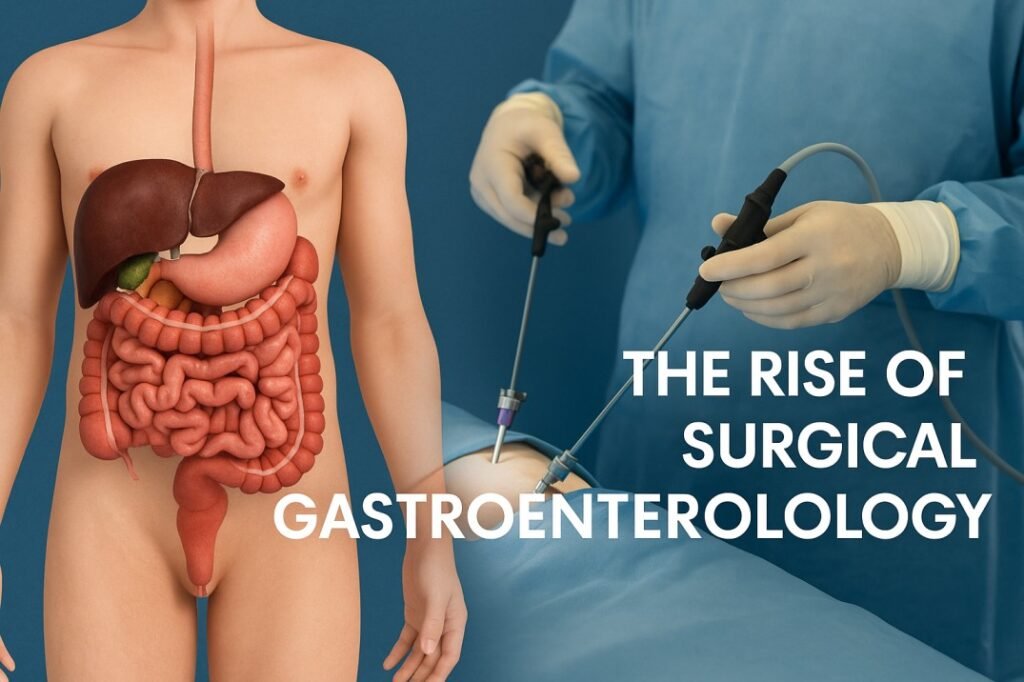The Rise of Surgical Gastroenterology
Digestive disorders are among the most common health challenges globally, affecting millions and often reducing quality of life. While many issues can be managed medically, others demand precise surgical interventions. This is where surgical gastroenterology comes into play, a specialized branch of medicine that focuses on the surgical management of gastrointestinal diseases, ranging from gallstones and hernias to cancers of the stomach and colon.
With innovations in medical technology and techniques, surgical gastroenterology is revolutionizing how we approach complex digestive conditions, ensuring faster recovery, minimal complications, and improved patient outcomes.
Understanding Surgical Gastroenterology
Surgical gastroenterology, also known as GI surgery, deals with diseases of the gastrointestinal tract, liver, pancreas, and bile ducts that require surgical intervention. This specialty has grown significantly in recent years, driven by increased awareness, early diagnosis, and cutting-edge technology.
Common procedures include:
- Laparoscopic gallbladder surgery (cholecystectomy)
- Hernia repairs
- Colorectal surgeries for cancer or inflammatory bowel disease
- Liver and pancreatic surgeries
- Bariatric surgery for obesity management
Why Surgical Gastroenterology Matters Today
As lifestyles have changed, digestive issues have become more prevalent. Unhealthy diets, stress, sedentary behavior, and genetic factors contribute to conditions like acid reflux, irritable bowel syndrome (IBS), ulcers, and cancers. While early-stage conditions may be treated medically, more advanced or structural problems require surgical solutions.
Surgical gastroenterology offers:
- Minimally invasive options: Reduced pain, faster healing
- Specialized interventions: For rare or complex disorders
- Targeted cancer treatment: Through tumor resection and reconstruction
- Obesity management: Laparoscopic bariatric procedures with long-term success
The Shift to Minimally Invasive Surgery
One of the most exciting advancements in surgical gastroenterology is the adoption of minimally invasive techniques, including laparoscopy and robotic surgery. These approaches allow surgeons to operate through small incisions using a camera and specialized instruments.
Benefits include:
- Shorter hospital stays
- Less postoperative pain
- Reduced risk of infection
- Faster return to daily activities
- Minimal scarring
Surgeries like laparoscopic appendectomy, colectomy, and anti-reflux surgery are now routine, offering patients superior outcomes compared to traditional open surgery.
Common Digestive Disorders Requiring Surgery
Here are some conditions where surgical gastroenterology has significantly improved treatment outcomes:
1. Gallstones and Gallbladder Disease
Laparoscopic gallbladder removal has become a gold standard for treating symptomatic gallstones and cholecystitis. It is a day-care procedure with minimal downtime.
2. Hernias
Surgical repair of hernias—inguinal, umbilical, or incisional—ensures that the organ or tissue remains in place and complications like strangulation are avoided.
3. Colorectal Disorders
From hemorrhoids to colorectal cancer, surgical gastroenterologists are trained in advanced interventions, including resections, anastomosis, and laparoscopic colectomies.
4. Liver and Pancreatic Surgeries
Cancers or cysts in these organs often need expert care. Hepatectomies (liver removal) or pancreatic resections can be lifesaving when done timely.
5. Obesity and Metabolic Disorders
Bariatric surgery not only supports weight loss but also improves metabolic conditions like type 2 diabetes and hypertension.
The Role of Multidisciplinary Care
Surgical gastroenterology does not function in isolation. It is most effective when paired with:
- Medical Gastroenterologists for diagnosis and non-surgical management
- Radiologists for high-precision imaging and interventional procedures
- Oncologists for cancer care integration
- Nutritionists for dietary planning post-surgery
- Psychologists to support mental well-being in bariatric cases
Hospitals that follow this multidisciplinary model provide comprehensive and personalized care, ensuring patients get the best possible outcomes from their surgical interventions.
How LGI Hospitals Is Leading the Way in GI Surgery
With access to skilled GI surgeons, advanced diagnostic facilities, and a patient-centric approach, LGI Hospitals is a preferred destination for those requiring digestive surgery. From minimally invasive techniques to post-operative care, the hospital upholds quality and safety at every stage.
Their team specializes in:
- Emergency surgeries for appendicitis and perforations
- Cancer surgeries with proper oncological protocols
- Day-care laparoscopic procedures
- Advanced liver and biliary surgeries
Explore their Surgical Gastroenterology Services to know more.
Empowering Patients Through Awareness
The field of surgical gastroenterology is not just about surgical procedures it’s about empowering patients with options, comfort, and confidence. As awareness increases and access improves, more people are opting for timely surgical care, significantly improving their long-term health.
Educating the public through digital content, awareness camps, and one-on-one counseling is critical. Encouraging early diagnosis and dispelling myths around surgery can reduce complications and boost trust in medical systems.
Final Thoughts
Surgical gastroenterology is truly transforming the landscape of digestive health. From routine laparoscopic procedures to complex oncological surgeries, it is paving the way for better outcomes and better lives. Institutions like LGI Hospitals, equipped with cutting-edge infrastructure and expert teams, are leading this revolution with compassion and precision.
Whether you or a loved one is dealing with chronic abdominal pain, an undiagnosed digestive issue, or a life-threatening GI condition, surgical intervention may be the key to long-term relief and recovery.





